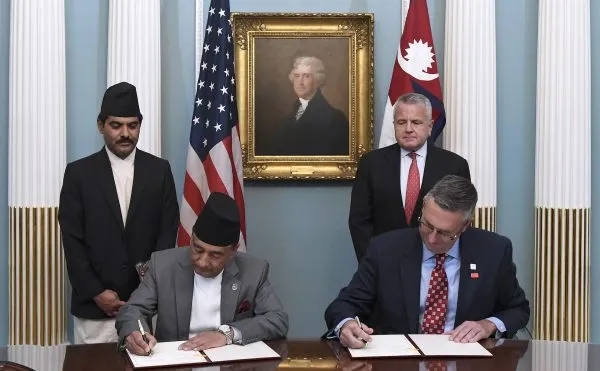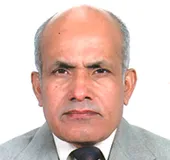
In its bid to alleviate poverty in developing countries, the United States (US) has signed the Millennium Challenge Corporation (MCC) agreement with 46 countries of the world. At the request of Nepal, the country signed the MCC agreement with the US on 14 September 2017, to receive
grant assistance worth US $500 million for the development of energy and roads. However, one of the strings attached with this agreement was that the recipient country had to get it ratified by the parliament. But even after four years, the agreement could not be ratified in this country.
Because of the serious differences among the political parties, the entire country is now widely divided over this issue, with one section supporting it while the other is opposing it. Those who support the MCC agreement often argue that it would enable the country to receive huge funds to build roads and transmission lines, which are vital for the development of the country. It is merely a gift from the American people to the people of Nepal.
Also, it is argued that a substantial portion of the US $500 million grants under MCC would be spent on the construction of the
Kathmandu-Hetauda-Butwal 400 KV transmission line, which could distribute 3,000 MW of power from the hydropower projects. Plans are afoot to connect this line with Gorakhpur
to sell surplus power to India. Expectations are high that it would increase the income and employment opportunities of the people, reduce poverty levels and, thereby, accelerate the rate of economic growth of the country.
On the other hand, the critics have a perception that the MCC is against Nepal’s national interest as it supersedes the laws of the land. They feel that it could enable the US to control the rights over intellectual property in the course of implementation of the agreement. Doubts are being raised that it favours India as the transmission lines under the project would be linked to the latter.
The MCC is against Nepal’s national interest as it supersedes the laws of the land. They feel that it could enable the US to control the rights over intellectual property in the course of implementation of the agreement. Doubts are being raised that it favours India as the transmission lines under the project would be linked to the latter
Additionally, the critics hold the opinion that the MCC agreement is part of the US government’s
Asia-Pacific strategy and in such a situation it could compel Nepal to fall under American strategic design. They also think that the MCC is aimed at
containing the BRI of China.
Because of the concerns of certain sections of the society regarding the MCC, Janardan Sharma, the Finance Minister, wrote to the MCC headquarters on September 3 and sought
clarifications on 11 questions related to the agreement. Soon afterwards, the US government sent a
13-page clarification to Finance Minister Sharma on September 8.
Realising the urgency of dispelling some of the doubts concerning the MCC,
Fatema Z Sumar, Vice President of MCC, reached Nepal on September 9. During her four-day visit, she had hectic parleys with leaders of different political parties, including the Nepali Congress, the Communist Party of Nepal–Unified Marxist-Leninist (CPN-UML), the Communist Party of Nepal–Maoist Centre (CPN-MC), the Communist Party of Nepal–Unified Socialist (CPN-Unified Socialist), the Janata Samajbadi Party (JSP) and the Loktantrik Samajbadi Party (LSP).
In her interaction with different political leaders and also with the media, Sumar tried to clarify that the MCC was not a part of the Indo-Pacific Strategy. She said that the MCC project was solely development-oriented and it could generate thousands of jobs for the Nepalese at a time when under the COVID-19 pandemic many people have
lost their jobs and livelihood support.
At the end of her visit to Nepal, Sumar also stated that much of the criticisms against the MCC was because it has gotten hugely politicised. She added that there has been much misinformation and disinformation around the programme.
Sumar’s clarifications on the MCC could not pacify the critics. They organised huge demonstrations on the streets of Kathmandu with play cards “No MCC” while she was in the town. Therefore,
the Home Ministry of Nepal warned the demonstrators not to get involved in activities that affected development projects in the country.
Presently, in the 271-member parliament, only 61 lawmakers of the ruling party, the Nepali Congress, and
13 members of LSP could be relied upon for their support to MCC. Other political parties–be it in the government or opposition—cannot be trusted for this purpose.
Amidst the growing voice against the MCC, even many of those who earlier used to support the MCC have now become silent. The situation has become so precarious that any argument in favour of MCC is branded as an act of
treason.
Amidst the growing voice against the MCC, even many of those who earlier used to support the MCC have now become silent. The situation has become so precarious that any argument in favour of MCC is branded as an act of treason.
In such a situation, Nepal’s Foreign Minister, Narayan Khadka, has stated that amendment to the MCC would not be acceptable to the US as it could have
ramifications with other countries with whom it has signed such an agreement. He also added that Nepal has already signed the agreement and, as such, any question related to its amendment appears to be ridiculous. Even about the Indian involvement in the MCC project, he categorically mentioned, ”Those who question the involvement of India should understand that without the consent of India, Nepal will not be able to sell its hydel energy and if India does not grant its consent, the MCC project will be meaningless.”
Since Nepal is divided over the MCC issue, the need of the hour is to develop a national consensus on the MCC and not to be
swayed by rumours. It has to choose if it wants to be like Sri Lanka that has cancelled the MCC agreement for certain reasons or like Mongolia, another landlocked country like Nepal, which has successfully been implementing it. If it cancels the MCC, that could affect the aid and assistance not only from the US but even from other multilateral institutions. But if it ratifies it, that could have its impacts as well. Now the ball is in Nepal’s court as it has to decide if it wants to live with or without MCC.
The views expressed above belong to the author(s). ORF research and analyses now available on Telegram! Click here to access our curated content — blogs, longforms and interviews.
 In its bid to alleviate poverty in developing countries, the United States (US) has signed the Millennium Challenge Corporation (MCC) agreement with 46 countries of the world. At the request of Nepal, the country signed the MCC agreement with the US on 14 September 2017, to receive grant assistance worth US $500 million for the development of energy and roads. However, one of the strings attached with this agreement was that the recipient country had to get it ratified by the parliament. But even after four years, the agreement could not be ratified in this country.
Because of the serious differences among the political parties, the entire country is now widely divided over this issue, with one section supporting it while the other is opposing it. Those who support the MCC agreement often argue that it would enable the country to receive huge funds to build roads and transmission lines, which are vital for the development of the country. It is merely a gift from the American people to the people of Nepal.
Also, it is argued that a substantial portion of the US $500 million grants under MCC would be spent on the construction of the Kathmandu-Hetauda-Butwal 400 KV transmission line, which could distribute 3,000 MW of power from the hydropower projects. Plans are afoot to connect this line with Gorakhpur to sell surplus power to India. Expectations are high that it would increase the income and employment opportunities of the people, reduce poverty levels and, thereby, accelerate the rate of economic growth of the country.
On the other hand, the critics have a perception that the MCC is against Nepal’s national interest as it supersedes the laws of the land. They feel that it could enable the US to control the rights over intellectual property in the course of implementation of the agreement. Doubts are being raised that it favours India as the transmission lines under the project would be linked to the latter.
In its bid to alleviate poverty in developing countries, the United States (US) has signed the Millennium Challenge Corporation (MCC) agreement with 46 countries of the world. At the request of Nepal, the country signed the MCC agreement with the US on 14 September 2017, to receive grant assistance worth US $500 million for the development of energy and roads. However, one of the strings attached with this agreement was that the recipient country had to get it ratified by the parliament. But even after four years, the agreement could not be ratified in this country.
Because of the serious differences among the political parties, the entire country is now widely divided over this issue, with one section supporting it while the other is opposing it. Those who support the MCC agreement often argue that it would enable the country to receive huge funds to build roads and transmission lines, which are vital for the development of the country. It is merely a gift from the American people to the people of Nepal.
Also, it is argued that a substantial portion of the US $500 million grants under MCC would be spent on the construction of the Kathmandu-Hetauda-Butwal 400 KV transmission line, which could distribute 3,000 MW of power from the hydropower projects. Plans are afoot to connect this line with Gorakhpur to sell surplus power to India. Expectations are high that it would increase the income and employment opportunities of the people, reduce poverty levels and, thereby, accelerate the rate of economic growth of the country.
On the other hand, the critics have a perception that the MCC is against Nepal’s national interest as it supersedes the laws of the land. They feel that it could enable the US to control the rights over intellectual property in the course of implementation of the agreement. Doubts are being raised that it favours India as the transmission lines under the project would be linked to the latter.
